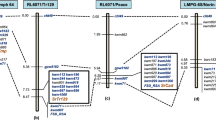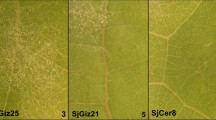Abstract
THE classical amphidiploid Raphanobrassica (2n = 36, genomic formula rrcc), first reported by Karpechenko1, was of considerable academic interest and appears in many textbooks. As far as is known Raphanobrassica does not occur in the wild and it has not been exploited practically.
This is a preview of subscription content, access via your institution
Access options
Subscribe to this journal
Receive 51 print issues and online access
$199.00 per year
only $3.90 per issue
Buy this article
- Purchase on Springer Link
- Instant access to full article PDF
Prices may be subject to local taxes which are calculated during checkout
Similar content being viewed by others
References
Karpechenko, G. D., J. Genet., 14, 375 (1924).
Macfarlane, I., J. Gen. Microbiol., 18, 720 (1958).
Johnston, T. D., Plant Pathol., 19, 156 (1970).
Paterson, W. G. W., Plant Pathol., 21, 145 (1972).
McNaughton, I. H., Euphytica, 22, 70 (1973).
Author information
Authors and Affiliations
Rights and permissions
About this article
Cite this article
MCNAUGHTON, I. Resistance of Raphanobrassica to Clubroot Disease. Nature 243, 547–548 (1973). https://doi.org/10.1038/243547a0
Received:
Issue Date:
DOI: https://doi.org/10.1038/243547a0
This article is cited by
-
Characterization of fertile amphidiploid between Raphanus sativus and Brassica alboglabra and the crossability with Brassica species
Genetic Resources and Crop Evolution (2008)
-
Interspecific somatic hybridization between Brassica napus and Brassica hirta (Sinapis alba L.)
Theoretical and Applied Genetics (1988)
Comments
By submitting a comment you agree to abide by our Terms and Community Guidelines. If you find something abusive or that does not comply with our terms or guidelines please flag it as inappropriate.



